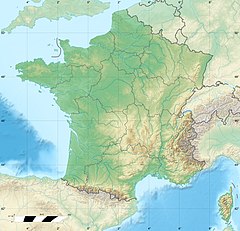Observatory of Paris
 |
|
| Observatory code | 005, 007 |
|---|---|
| Location |
14th arrondissement of Paris, France |
| Coordinates | 48°50′11″N 2°20′11″E / 48.836439°N 2.336506°ECoordinates: 48°50′11″N 2°20′11″E / 48.836439°N 2.336506°E |
| Website | www |
| Telescopes | Large equatorial coudé of Paris |
|
[]
|
|
The Paris Observatory (French: Observatoire de Paris or Observatoire de Paris-Meudon), a research institution of PSL Research University, is the foremost astronomical observatory of France, and one of the largest astronomical centers in the world. Its historic building is to be found on the Left Bank of the Seine in central Paris, but most of the staff work on a satellite campus in the Meudon suburb of Paris.
Administratively, it is a grand établissement of the French Ministry of National Education, with a status close to that of a public university. Its missions include:
It maintains a solar observatory at Meudon (48°48′18.32″N 2°13′51.61″E / 48.8050889°N 2.2310028°E) and a radio astronomy observatory at Nançay. It was also the home to the International Time Bureau until its dissolution in 1987.
Its foundation lies in the ambitions of Jean-Baptiste Colbert to extend France's maritime power and international trade in the 17th century. Louis XIV promoted its construction, which was started in 1667 and completed in 1671. It thus predates by a few years the Royal Greenwich Observatory in England, which was founded in 1675. The architect of the Paris Observatory was Claude Perrault whose brother, Charles, was secretary to Colbert and superintendent of public works. Optical instruments were supplied by Giuseppe Campani. The buildings were extended in 1730, 1810, 1834, 1850, and 1951. The last extension incorporates the spectacular Meridian Room designed by Jean Prouvé.
...
Wikipedia

